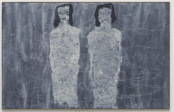Baffling or Brilliant? ‘Cadenza’ begs the question.
So NME accuse this album of ‘musical incompetence’ and being ‘baffling’, whilst The Fly go with ‘one of 2011’s most exciting prospects’. Things are already juicy.
The issue is simple. Cadenza has some unusual time signatures on some of the songs which, by virtue of allowing the next melodic bar to start in places where a pop or rock record normally wouldn’t, upset the listener’s natural tendency to tap a foot or nod their head whilst listening (a tip: on listening to the title track, nod your head seven times to each bar instead of four). Sometimes the tempos actually change mid-song, which is terribly upsetting for those with a musical sensibility not rooted in those big tempo-stepups that Tony Iommi used with Black Sabbath.
However, for those who have been keeping up with some of the better glitch-electronica producers, the abrupt technique is recognizable. Breaking Pop out of the 4/4 time, twelve-bar tradition is worth a try – jazz, prog and electronica acts have been striving to do so for decades, although the results have rarely been as listenable as Cadenza.
But… jazz; prog, electronica; shifting time signatures, it’s all a bit, well… pretentious, isn’t it? Especially when the band go around namechecking ‘the eccentricities of Sparks, the piano methods of Steve Reich and the unhinged prog-pop of the Cardiacs‘ in their publicity materials. If a band weren’t careful, this ploy to set themselves apart from their city’s image as a haven of spotty-backed landfill indie-chanting monobrows, could turn people off. Shall we try to offset that a bit?
See, it probably is all those things – clever, artistic, cerebral, innovative, mould-breaking and referential of all that is arcane and obscure (German minimalist electro, modern classicists and Brummie neo-prog outfits that none of us have ever heard of). Yet that really doesn’t matter, because it’s also an energetic string of ballsy pop hooks, and meaty guitars, and pinpoint vocal harmonies, and poppin’ b-lines. It is also more fun than a trailerload of bridesmaids marinated in peach schnapps.
Intimidated by Steve Reich or Neu? Don’t blame ya. Here’s some other stuff you can hear in there: Jane’s Addiction (the guitar figure in ‘Cadenza’ sounds like ‘Just Because’), Yes (‘Fragrant’s ticking guitar lick comes straight off ‘Owner of a Lonely Heart’), Hot Chip (Duncan Wallis on vocals sound like Alexis Taylor), Michael Jackson (the trickling keyboards on Zalo are the spit of ‘Human Nature’), Queen (there’s a chunk of ‘Seven Seas of Rhye’ in the opening track), and Ben Folds (well, there’s piano, innit?). Plus, there is quite a chunk of Reich’s Electric Counterpoint in there, just so we’re clear.
There was a chap in the ’60s called Hans-Robert Jauss who developed a critical approach to art called Reception Theory. The premise being that any artistic work is not merely passively accepted by the beholder, but that it is interpreted differently depending upon the cultural and life experiences of the viewer/listener/reader. Happily it allows us all to say to ourselves ‘well, maybe it’s supposed to sound like Steve Reich, but I’m sure that ‘Dolli’ sounds like The Beach Boys, and that ‘Dressage’ sounds like The Strokes as sung by a mellow-mooded Johnny Rotten’. Also, if Dutch Uncles themselves have an opinion about their own album (such as that ‘Dolli’ was thus entitled as an abbreviation of the Italian musical term ‘Dolcezza’) we are all within our critical rights to say, ‘that’s a load of pretentious wank. It sounds like Sunflower-era Beach Boys, and that’s a compliment. Now be quiet. So, ‘baffling’? Fixed that for ya.
Oh my, what a fun album this is though! The sweet guitar work on X-O, set against Wallis’ vocal, is remarkable. Well-executed counterpoint is a rarity in pop, and usually gets shunted into etheral but meandering middle-eights. Here it manages to be delicate yet driving, with a rhythm track that makes you want to purse your lips and groove. As with so much of this album, it’s technically intricate, but who cares about the back end when the songs sound so good? (It’s a cribbed version of Steve Reich’s ‘Electric Counterpoint III’, also recognizable in The Orb’s ‘Little Fluffy Clouds’ but is tweaked nicely to fit). ‘The Rub’ is an absorbing and smile-inducing glockenspiel soother that, if it only had kettledrums, would pass as a Brian Wilson creation. Only on ‘The Ink’ and ‘Orval’ does the quality dip. Both tracks suffer from over-production, the clarity of the songs lost a little to keyboard chords. The enforced wackiness of ‘OCDUC’ is also a little irritating, and its central piano line does nothing to disguise the limitations of an under-confident pianist. But those are the lowest ebbs, and are insignificant against the bulk of the album. This is a balanced and accomplished collection of songs, with moments that are simply spectacular.
Cadenza out now on Memphis Industries
Images by Ian West
Sean Keenan used to write. Now he edits, and gets very annoyed about the word ‘ethereal’. Likely to bite anyone using the form ‘I’m loving….’. Don’t start him on the misuse of three-dot ellipses.
Divides his time between mid-Spain and South-West France, like one of those bucktoothed, fur-clad minor-aristocracy ogresses you see in Hello magazine, only without the naff chandeliers.
Twitter: @seaninspain














